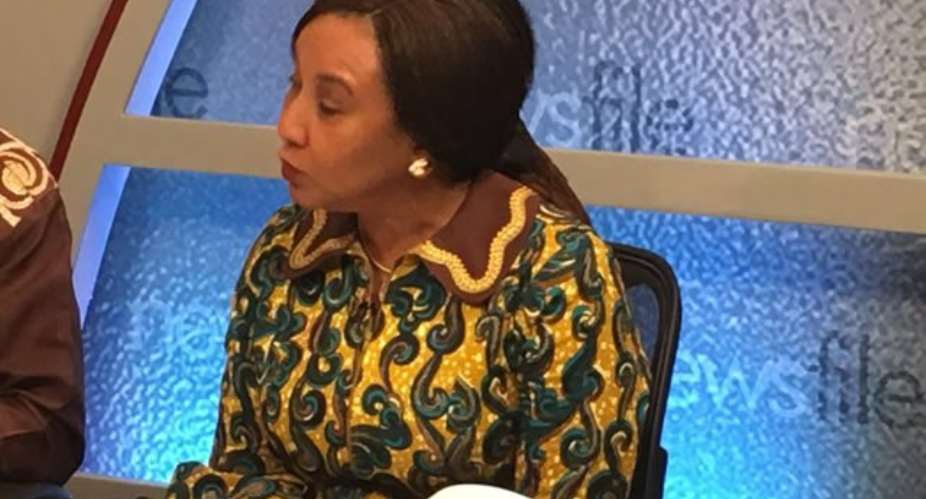Deputy Finance Minister, Mona Quartey, has admitted Ghana’s credit facility with the International Monetary Fund (IMF) is tough, but it is the best deal for the country.
She dismissed suggestions for a renegotiation of the Extended Credit Facility insisting the difficult economic conditions that forced Ghana to the IMF have resulted in the deal that many analysts say has been counterproductive.
“The IMF programme was an ambitious one with a frontloading but that was the prescription that was required for the situation that we were in at the time that we signed up.
Ghana signed a $940 million three-year Extended Credit Facility with the IMF aimed at propping up the country’s economy.
The IMF facility makes it mandatory for Ghana to restrain and prioritise public sector spending, increase tax collection and strengthen the effectiveness of the Bank of Ghana’s monetary policy role.
“It is painful,” she acknowledges, but the country has gone through the most difficult aspects already.
Mrs Quartey was speaking Saturday on news analysis programme, Newsfile, on the Joy News channel on Multi TV which discussed economic growth figures contained iin Finance Minister, Seth Terkper's mid-year review.
She was reacting to claims by other panelists on the programme that contents of the Finance Minister's presentation to Parliament are an indication the IMF deal stifles spending that is needed to boost the economy.

A Senior Research Fellow at the Institute of Fiscal Studies (IFS), Saeed Buachi, for instance said lack of higher growth figures in the Finance Minister’s presentation was the result of strenuous spending guidelines that came with the IMF facility.
He said the time frame within which the Fund was expecting government to cut down public sector and other spending has proven inimical to economic growth.
“Within a very short time, within three years they [IMF] want you [government] to reduce fiscal deficit from above 10% to 3%. Of course fiscal consolidation we all want it. But why would a government agree within such a short period drastically reduce the economy, you are going to cripple the economy.,” said Saeed on Newsfile.
A Ranking Member of Parliament’s Finance Committee and New Patriotic Party (NPP) Legislator for Old Tafo, Anthony Osei Akoto, also said the unhealthy fall in spending for infrastructure was bad.
“In this Supplementary budget, capital expenditure, both foreign and domestic, is going down by about 300 million and there is a trend. If [government] keeps bringing it down there will not be growth,” he said.
A member of the Progressive People’s Party (PPP) economic team, Mahama Bawa also did not find growth figures in Seth Terkper’s review favourable, singling out the agriculture, unemployment and high interest rate figures as major setbacks.
However, in a sharp rebuttal, Mona Quartey said although the Finance Minister’s presentation contained some failings – fishing for instance that grew by a negative 4% -- the country’s overall growth rate has been consistent with growth projections for Africa and the world.
“When we are speaking about the growth rate, we do need to be careful. We all wish for a much higher growth rate. We cannot grow so much faster than the rest of the world. World economic growth last year was at 3.1%. Sub-Saharan Africa was at 3.4% (growth) but Ghana was at 3.9%. So compared to the rest to the rest of the world we are not doing that badly,” said Mona Quartey.
She adds that growth projections for the world have been put at 3.2% and 3% for sub-Saharan Africa by global experts, “we [Ghana] are forecasting 5.4% of which we have started to do well already. We are on track”.
Story by Ghana | Myjoyonline.com | George Nyavor | [email protected]





 SSNIT must be managed without gov’t interference – Austin Gamey
SSNIT must be managed without gov’t interference – Austin Gamey
 Ejisu by-election could go either way between NPP and independent candidate — Gl...
Ejisu by-election could go either way between NPP and independent candidate — Gl...
 We never asked ministers, DCEs to bring NPP apparatchiks for returning officer r...
We never asked ministers, DCEs to bring NPP apparatchiks for returning officer r...
 No one denigrated the commission when you appointed NDC sympathizers during your...
No one denigrated the commission when you appointed NDC sympathizers during your...
 Used cloth dealers protests over delayed Kumasi Central Market project
Used cloth dealers protests over delayed Kumasi Central Market project
 A/R: Kwadaso onion market traders refuse to relocate to new site
A/R: Kwadaso onion market traders refuse to relocate to new site
 Dumsor: Corn mill operators at Kaneshie market face financial crisis
Dumsor: Corn mill operators at Kaneshie market face financial crisis
 Jamestown fishermen seek support over destruction of canoes by Tuesday's heavy d...
Jamestown fishermen seek support over destruction of canoes by Tuesday's heavy d...
 Election 2024: EC to commence voter registration exercise on May 7
Election 2024: EC to commence voter registration exercise on May 7
 Public schools rebranding: We’re switching to blue and white, we’re painting all...
Public schools rebranding: We’re switching to blue and white, we’re painting all...
